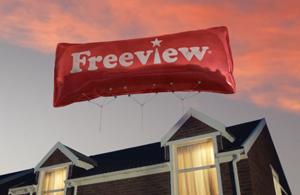UK TV viewers remain traditional in tastes, says survey
 UK TV viewers remain broadly traditional in their TV preferences, but strongly identify with programme ‘superbrands’, according to research carried out for free-to-air digital-terrestrial TV platform Freeview.
UK TV viewers remain broadly traditional in their TV preferences, but strongly identify with programme ‘superbrands’, according to research carried out for free-to-air digital-terrestrial TV platform Freeview.
According to the Freeview survey, carried out by ICM, over half – 52% – of respondents act as television ‘brand advocates’, saying they will recommend a TV programme they have enjoyed. Some 21% say they watch extra or behind-the-scenes spin-off shows related to their favourite programmes.
Many viewers said they feel closer to some TV ‘super brands’ – including Sherlock, with a 23% score on this question, and Mrs Brown’s Boys, with 22% – than to major household brand names like Apple, with 21%, and Coca Cola, with 16%.
Viewers remain somewhat risk-averse, with 43% choosing programmes that are recommended by family or friends and 35% choosing programmes that feature a favourite actor.
Some 29% said that TV helps bring together family, partners or housemates together, while 31% said they were willing to make some kind of compromise or joint decision with family or housemates about what to watch.
According to the survey, 52% of respondents said that TV admit to being ‘telly addicts’, with 21% saying they watch their favourite programmes out of habit and 33% saying TV brings a sense of structure to their life.
“Our research shows the pivotal role TV plays in many people’s lives. It helps us relax and unwind, but also brings us closer to those we love and to the outside world. Advances in technology are making this easier than ever before. Catch-up and on-demand TV have given people a new ability to personalise how they watch television, allowing it to fit in with their daily life. That is why we are excited to be launching Freeview Play, which will allow everyone to fit TV around their personal needs,” said Freeview managing director Guy North.
“However it’s important to note that while we are witnessing technological change, most people, most of the time, watch the same kinds of programmes they always have. Old habits die hard, and Brits are tied to the three ‘Cs’: caution, compromise and choice. Technological innovation enables this but there is also an opportunity for the industry to balance ground-breaking ‘critics’ choice’ programming with shows that appeal to a mass market.”



